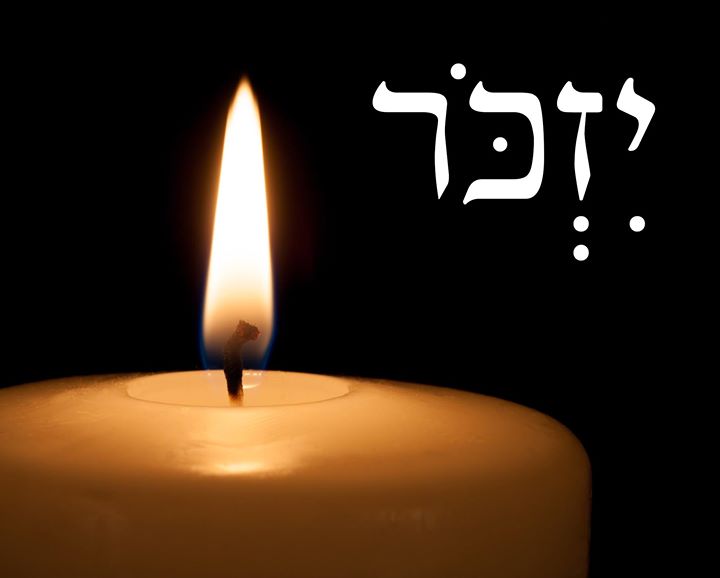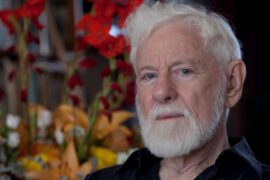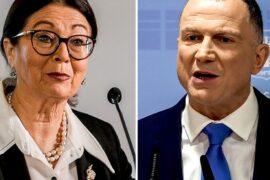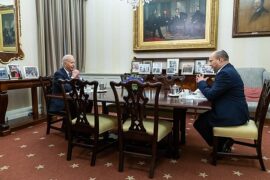Over 7,000 people — mostly Israelis — joined Jewish and Palestinian bereaved families at Tel Aviv’s HaYarkon Park Tuesday evening for a joint memorial ceremony billed as an alternative to standard Israeli Yom HaZikaron events.
The program’s two emcees, one Jewish and one Palestinian, began the evening by praising the Israeli Supreme Court decision earlier in the day for ordering Defense Minister Avigdor Lieberman (Yisrael Beiteinu) to — despite his staunch opposition to the event — grant entry permits to 90 West Bank Palestinians so they could attend the service.
Just outside the fenced off section of the park, some 150 activists from the right-wing Otzma Yehudit party protested the ceremony. Demonstrators burned a Palestinian flag, hurled insults at participants as they arrived and briefly chanted anti-Arab slogans.
The event’s organizers — Combatants for Peace and the Israeli and Palestinian Bereaved Families for Peace — also reported a number of “violent instances” that unfolded just beyond the ceremony grounds, where Otzma Yehudit demonstrators “hurled stones and bottles” at attendees. Police were reported to have eventually dispersed the protesters.
When examining the events of Tuesday night, as well as the opposition from public officials (way beyond Lieberman) and the Israeli street (it’s become clear in recent years that the protestors are not as marginal in Israeli society as many would’ve liked to believe), it’s important to unpack some fundamental issues.
Most Israelis reject out of hand any attempt to include Palestinians in a memorial ceremony on Yom HaZikaron. They find it deeply offensive, especially given the fact that in the narrative through which most Israelis currently experience the conflict, Palestinians are “the enemy” and largely responsible for many of deaths being mourned on this day.
The term “narrative” in this case specifically refers to a version of reality – a story told about a chain of events that organizes facts while being influenced by ideology. The same chain of events can be organized into many narratives, especially if influenced by different ideologies.
The separate narratives in which Israelis and Palestinians live very much inform how we relate to history, to ourselves and to each other in this country. Expanding Yom HaZikaron to include victims from both sides directly challenges the mainstream Zionist narrative and feels to most Israelis as an affront to the memories of those lost.
Palestinians of course have their own unique narrative that informs the way they understand and experience this conflict. It casts Israelis as the antagonist in their story, primarily responsible for the injustices and suffering they’ve endured.
Those Palestinian thinkers and activists who have reached a place where they can even consider participating in a joint memorial service for both peoples have already transcended their people’s narrative to the extent that they can make the necessary space for moving forward together with us. But by refusing to even entertain the idea of sharing the day, the vast majority of Israelis send the message that Palestinians – no matter how peaceful – can never truly become part of our society. This refusal reinforces the rival generic narratives that view one side as wholly virtuous and the other as completely evil.
The best way for Israelis and Palestinians to truly end this conflict is to create a larger narrative that is inclusive enough to encompass both ostensibly rival narratives. We must become co-protagonists in the same story with a shared struggle. And a shared memorial day for the thousands of victims on both sides would go a long way in facilitating the construction of such a narrative as it would help us to both recognize that we’re both victims of a situation that isn’t exclusively our fault or theirs. It might even reveal a new shared antagonist in our story that has until now remained hidden behind the hostility both our peoples are busy directing at one another.
A shared memorial day for Jews and Palestinians to mourn our dead could theoretically go a long way in contributing to a healthier relationship dynamic. Such a day would help us to see that both peoples have pain. It would help us to stop seeing one another as merely the antagonists of our own stories and start recognizing that we’re actually both victims of the same brutal conflict that allows outsiders to benefit from the pain we inflict on each other. Such a day would go a long way in healing the hatred and mistrust. It would show each other and ourselves that while we can never forget, we can forgive and move forward.
But that day can’t be Yom HaZikaron.
Yom HaZikaron is about something unique to the Jewish experience. It’s about commemorating the fact that after thousands of years living as defenseless victims, a spirit of valor rematerialized within our people — an ancient warrior spirit so central to our identity but lost thousands of years ago due to the destruction of our national framework.
Without trying to downplay any other group’s pain, it’s unlikely that outsiders are capable of appreciating the importance of this day to the Jewish experience of being so easily persecuted, abused and even massacred while feeling totally powerless yet carrying a faint memory of a time long before in which we were a people known as much for our sword as for our book.
A proud scholar-warrior people had been beaten, broken and scattered throughout the world. We experienced so much trauma in an exile experience that conditioned us to become psychologically incapable of self-defense. A more Jewish way of explaining this might be that we lost our “right hands” — exactly what King David warned would result from forgetting Jerusalem and our identity. We’d lose our natural ability to use force when appropriate.
But as we started to remember Jerusalem and began returning home, a spirit of valor and self-sacrifice returned. We remembered Jerusalem and suddenly remembered our right hands. We reconnected to our ability to love something enough that we’d be willing to fight and sacrifice our lives on its behalf.
This is the essence of Yom HaZikaron and this is why Jews can’t share the day with anyone else. The experience that contextualizes the day and gives it meaning is unique to the Jewish people, to our identity and history. The more we consciously acknowledge this truth, the more honest we can be — both with ourselves and with our Palestinian neighbors.
The hard truth is that Israel already altered the meaning of Yom HaZikaron when we added terror victims to the original fallen soldiers we commemorate on the day before we celebrate our independence. So if we’re already diluting the day to include anyone we’ve lost in the conflict, why not include fallen Palestinians as well?
We should absolutely be seeking to grow past our one-sided narrative and present Palestinians with a legitimate way to be included in our society. It’s become increasingly clear that we’re not going to divide this land so it’s important we initiate real discussions about how we’re going to live together in one state.
The answer for this specific issue might simply be to establish a new day to remember victims of the conflict while restoring Yom HaZikaron to what it once was — a day to honor those Jewish fighters who willingly gave their lives in the struggles to free our land from Britain, Jordan and Egypt, as well as those who fell fighting in the wars to defend our homeland and people. Once again emphasizing this spirit of valor and contrasting it with our experience as helpless victims in exile would better clarify and highlight the uniqueness of the day to our people.
Making Yom HaZikaron once again exclusively about our fallen heroes would create the necessary space to establish a new day for us and Palestinians to mourn our dead together — a day for remembering the victims on both sides of our conflict that would help create a shared narrative inclusive enough to encompass both ostensibly rival narratives.





